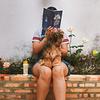Take a photo of a barcode or cover
I started enjoying it more when we got to the war parts (and while I did like the later peace parts more than the first one I kept enjoying the war parts more than those. Switching to an audiobook for the duller parts might also have played a role). I think that characters being less petty and frustrating played a large role in that. It did get better when the female characters started feeling less vapid and shallow than I felt they often came across in the earlier pages, something I picked up on after the first switch from more wary stuff back to a life of privilege. While there were still a lot of people to try keep track of the actual writing wasn't particularly difficult to read when I was actually interested in what was happening. I did find my interest slipping when things got less interesting to me though. I don't think it quite lives up to its reputation as the "best book ever" (I feel like it was a bit long at times) but I can see why some people love it so much. It was definitely an interesting insight into Russian culture and the attitudes of the time. Will I reread it? Probably no. But if you are interested in the time period and want to read this book, it does get better after the initial slog. Or at least it did for me.
Graphic: Death, Mental illness, Violence, Grief, War
Moderate: Animal cruelty, Animal death, Misogyny, Suicide attempt, Injury/Injury detail
Minor: Alcohol
I read it with an audiobook of the Briggs translation.
Lots to enjoy and appreciate in this book. The accompanying notes from the translators were very helpful.
Part two of the epilogue was a challenge to read and appreciate. I could imagine myself revisiting this book and comparing translations.
The writing of female characters annoyed me on multiple occasions in this book and speaks to Tolstoy’s unconscious misogyny and sexism. I’d be interested in reading a retelling of helene’s experience. Some of the chapters on Natasha gave me the ick for Tolstoy’s male gaze compounded by the male gaze of the male characters.
Moderate: Death, Violence, War
Sam Woolf is my favourite narrator here.
The audiobook needed better labels of the sections. And I would have wanted to hear the intro essays early on. Listening at he end helps ease the frustration with book two of the epilogue.
Too many thoughts and no energy to write them out for now.
Moderate: Death, Violence, Police brutality, Grief, War
I'm not fond of Tolstoy's decision to drop the narrative at certain points of the book to preach in his own voice about the reasons he believes certain historical events occurred, the nature of man, or his opinions on determinism. It feels as though, rather than letting the narrative speak for itself, he needs to explicitly state the ideas he means to convey.
It feels like sacrilege to say that I largely did not like War & Peace given its cultural relevance, but these are my honest thoughts on it.
Graphic: Death, Death of parent, War
Moderate: Child death, Violence, Grief
Em dezembro de 2023, enquanto eu mexia no storygraph, decidi entrar em algumas leituras coletivas e essa foi uma delas.
Sempre achei que esse ia ser um dos livros que não era para mim, o seu tamanho e condição como um clássico me assustaram. Ainda bem que estou forçando minha cabeça a esquecer essa ideia e experimentar leituras diferentes.
A escrita do autor te prende e força a lutar contra a vontade de tentar finalizar o livro todo em uma sentada.
Eram tantos tipos de relacionamentos e personagens, fiquei impressionada em como todos foram marcantes. Meus momentos favoritos foram os em que envolviam Pierre, ele foi um homem interessante e que se pode observar sua evolução de jovem órfão bastardo para um homem de família adulta.
Eu me senti encantada com as descrições da Rússia e pude observar como funcionam as interações sociais dependendo do local onde observamos que eles estão. Senti que a descrição da guerra e o cenário de destruição e morte do autor me deixaram sufocado de panico.
Espero que, após ler minha resenha, o leitor sinta a curiosidade de pegar o livro, vale a pena dar uma chance para ele e sei que muitos vão gostar. Recomendo não se colocar um tempo limite para terminar a leitura e só a aproveitar.
Graphic: Death, Terminal illness, Violence, War
Graphic: Death, Gore, Terminal illness, Toxic relationship, Violence, Medical content, Grief, Medical trauma, Death of parent, War, Injury/Injury detail
Moderate: Adult/minor relationship, Infidelity, Pregnancy, Fire/Fire injury, Alcohol
Graphic: Death, Violence, Medical trauma, Murder, War
Moderate: Death of parent
Minor: Infidelity
Graphic: Adult/minor relationship, Death, War
I approached this reading of "War and Peace" with the intention of consuming the story at a rapid pace, finishing the novel within 3 weeks. This approach helped me maintain continuity and grasp the complex narrative that spans a considerable period and shifts between various characters, locations, and themes. However, I plan to read it more slowly next time to fully marinate in the story and its concepts.
Tolstoy explores profound themes including the nature of history, the purpose of war, the concept of power, the quest for redemption, the importance of honour, and the role of religion. The theme of power and the role of leaders in shaping history, or rather their lack of control over it, particularly resonated with me. The theme of redemption drove me deeper into the book as I watched various characters undergo significant transformative arcs.
The historical context of the Napoleonic Wars is crucial to the narrative, grounding it in a time of great uncertainty and upheaval. It is true that Tolstoy's detailed military descriptions and philosophical reflections can be challenging, and indeed a bit rambling, but they are essential to forming this body of work, and without which, War and Peace would be lesser. Throughout the descriptive war portrayals, Tolstoy maintains a focus on the personal perspectives of individuals, which kept me engaged and connected to the action.
By the end of the book, I felt deeply for the trio of Andrey, Pierre, and Natasha, appreciating their transformations and struggles. Pierre's journey—marked particularly by his spiritual awakening during his imprisonment—was particularly moving, and Natasha's experiences of loss and love were heart-wrenching.
Having read Anna Karenina before War and Peace, I was surprised to find that the latter resonated more with me, in which I was more engrossed, enamoured with the characters, and engaged with Tolstoy’s philosophical musings. perhaps another valid comparison is between War and Peace and Dostoyevsky’s Crime and Punishment, penned just one year after. I find that, while both are doubtlessly literary masterpieces, Crime and Punishment edges it just slightly due to its fascinating exploration of a murderous protagonist’s mind and its profound themes of sin, guilt, repentance, forgiveness, and morality.
Nonetheless, I believe "War and Peace" is essential reading for everyone at least once in their life. Its exploration of timeless themes through richly drawn characters, coupled with its historical context and philosophical insights, make it a deeply rewarding and thought-provoking read.
Graphic: Death, Violence, Grief, War
Moderate: Ableism, Animal cruelty, Confinement, Infidelity, Sexism, Transphobia, Classism
Minor: Racism
Graphic: Death, War
Moderate: Adult/minor relationship, Animal cruelty, Domestic abuse, Emotional abuse, Incest, Infidelity, Mental illness, Grief, Death of parent, Injury/Injury detail, Classism
Minor: Addiction, Alcoholism, Bullying, Cursing, Drug use, Sexism, Sexual content, Toxic relationship, Violence, Blood, Suicide attempt, Schizophrenia/Psychosis , Pregnancy, Alcohol





